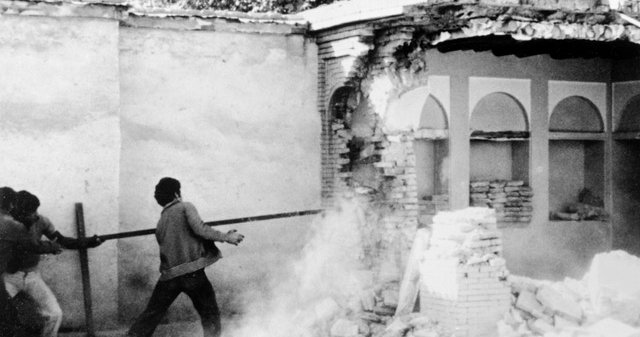
On Monday, 3 February the Islamic Republic upheld death sentences for seven Sunni Kurds after some ten years of holding them in detention on charges of Muharibih (waging war against God), and spreading propaganda against the regime. Earlier this year, the Islamic Republic officially barred Iranian Baha’i citizens from holding national ID cards, thereby denying them the basic rights of a citizen, and removing the “other religions” option from official forms.
Criminalizing religious minorities
Iran’s constitution names the Twelver Ja’fari School of Shi’a Islam as the state religion. It recognizes “Zoroastrian, Jewish, and Christian Iranians” as the only recognized religious minorities. That excludes the Sunnis, Yaresan (Ahl-e Haq), Erfane Halgheh, and the Baha’is from the minimum protections and recognitions that have been granted by Iran’s Islamic Constitution. Although Zoroastrian, Jewish, and Christian (especially converts) minorities of Iran have historically been persecuted, imprisoned, executed, and forcibly exiled, Sunnis and Baha’is have faced the most brutal persecution over the last four decades. According to Human Rights Activists in Iran, in 2019, Baha’is, Sunnis, and Christians respectively have been the most persecuted by the Islamic Republic of Iran.
In Iran, where the Baha’i religion was founded, universities under the government’s direction refuse to admit Baha’i students. Baha’i cemeteries have been destroyed, and current Supreme Leader Ayatollah Ali Khamenei has confiscated property from Baha’i families. Javaid Rehman, the UN Special Rapporteur on the Situation of Human Rights in the Islamic Republic of Iran stated in his most recent report that “over the past 40 years, the Baha’is, considered to be the largest non-Muslim and unrecognized religious minority in the Islamic Republic of Iran, numbering an estimated 350,000, have suffered from the most egregious forms of repression, persecution and victimization.”
Similar to the Bahai’s, and in August 2016 alone, Iran executed 25 Sunni Kurds on charges of Muharibih. In 2018, Iran became the world’s second leading state executioner, after China. Although Iran reduced its number of executions in the last a few years, mainly due to a change in the law about narcotics offenses, execution of racial and religious minorities continues in full force.
Dozens of Christians, including converts, were subjected to harassment, arbitrary detention and prison sentences for practicing their faith. Raids on house churches continued, states Amnesty International in its 2019 review of the situation of human rights in Iran.
Many of the officials who are suspected of being involved in mass extrajudicial executions, continue to hold positions of power in the judicial system of Iran. In 2017, Alireza Avaei was appointed as Iran’s minister of justice. In 2019 Ayatollah Ali Khamenei appointed Ebrahim Raisi as the head of Iran’s judiciary. Raisi –similar to Avaei and his predecessor (Mostafa Pour Mohammadi, Iran’s minister of justice from 2013 to 2017)- was a member of the “Death Commissions” that ordered the extrajudicial killings of thousands of prisoners, including the Kurds in 1988. His appointment has ended any remaining hope of salvation for political prisoners, especially those pertaining to racial and religious minorities. “The selection of Raisi to serve as head of the judiciary will send a clear message: the rule of law has no meaning in Iran, and those who participated in mass murder will be rewarded,” said Hadi Ghaemi, the executive director of Center for Human Rights in Iran.
Raisi’s selection came after such minorities, particularly the Kurds, voted for his opponent, President Hassan Rouhani, in the country’s 2017 presidential election. The recent persecution against religious minorities exacerbates an ongoing conflict between conservatives and ‘reformists’ over the upcoming 2020 parliamentary elections, and the 2021 Iranian presidential election.
The IRGC, the Islamic Revolutionary Courts, and the Muharibih
The overwhelming majority of the current top echelons of The Islamic Revolutionary Guard Corps (IRGC) began their careers in the Kurdish region when the Kurds rebelled against the imposition of Islamic rule in 1980, creating the first serious crisis for the revolutionaries. Similarly, the overwhelming majority of the current top revolutionary judges in Iran also began their careers in the Kurdish regions.
The first Supreme Leader, Ayatollah Ruhollah Khomeini, issued his infamous Jahad fatwa in 1980 against the Kurds and other dissidents killing more than 30000. He appointed the revolution’s notorious “hanging judge,” Ayatollah Khalkhali, to head the newly created Revolutionary Courts. Hundreds of Kurds were executed by Khalkhali on charges of Muharibih. Khalkhali frequently sentenced defendants to death in summary trials where he acted as both judge and prosecutor, without a jury or defense lawyers.
Current revolutionary judges, such as Abolqasem Salavati, Mohammad Moghiseh, and Ali Razini, have invoked the term Muharibih in the context of cracking down on the recent protests in Iran, particularly since the presidential election protests of 2009. By using a legal ideal and vaguely worded offences such Muharibih, which has been designed at the first place to safeguard Muslims, for punishing the political oppositions, the Islamic Republic has aimed to dehumanize the opposition, particularly religious and racial minorities.
PrintHaidar Khezri | Radio Free (2020-02-23T23:00:00+00:00) Iran’s ongoing war against its religious minorities. Retrieved from https://www.radiofree.org/2020/02/23/irans-ongoing-war-against-its-religious-minorities/
Please log in to upload a file.
There are no updates yet.
Click the Upload button above to add an update.